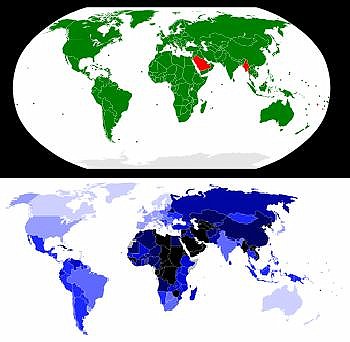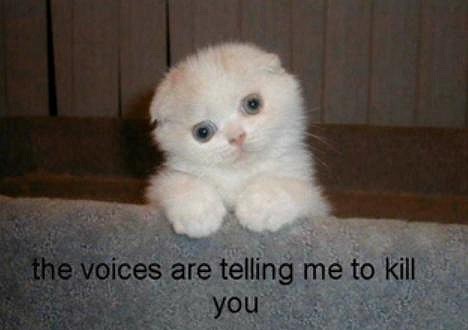You know Derren Brown? The British illusionist, mentalist, magician, author...? He is so hot. I repeat, HE is so sexy.
I am a bit confused.

You know Derren Brown? The British illusionist, mentalist, magician, author...? He is so hot. I repeat, HE is so sexy.
I am a bit confused.

Maybe it's my own loneliness that does it, my craving for a connection with someone, that I see them everywhere. Happy people. Friends talking to each other, couples, holding hands, kissing, being happy. Belonging. And I feel so separated from them, from everyone. As if I am a spot of mold in an otherwise good bread. Something that does not belong, something that should be rid of.
I'm watching the final season of 'L Word'. I'm living through them again. Watching their frinedship, making new friends, encountering problems and getting through them together. Watching Bette and Tina's relationship, hoping I'd have something like that. Someone with something in common. Someone I could trust so completely. Someone to protect and someone to protect me. Someone to understand me. Someone I'd understand. Someone to share my life with, my stupid little mundane everyday life.
I just feel so alone.

I was just reading Helsingin Sanomat and their article about cannabis. It has been scientifically proven that alcohol and tobacco are worse and more addictive than weed. And yet they are legal while cannabis is not. Now, this article about the survey conducted on junior high/high school students says that they tend to have vast knowledge how to get hold on (illegal) drugs. But personally...
In my experience, the people, the "narcs", I know they exist but I never see them. To me drug users and sellers are some American thing, something that is a small minority here in Finland. And then something like this comes along? Is it because I don't party, go to nightclubs and so on that I have no knowledge of this underground culture? Is it really that easy to buy drugs on the street? Where do these people hear from the people to go to? Is it mouth to mouth, or is there some symbolic code system I don't know about (apparently, according to 'Amy's Law', certain animals and shapes symbolise certain drugs on party posters)?
What do you think/know? Answers are welcomed.
To pass the time and get inspiration on the matter - FactVsReligion went to LA for some book burning:

While surfing in YouTube I ended up watching an Intelligence Squared debate of the motion "The United Nations should be suplemented by the League of Democracies". Here are some thoughts that came to my mind.
Firstly, I am not arguing that the UN has not done things to improve the world because it certainly has. The history of having done something right is not, however, sufficient to justify the monopoly of it today. In my opinion the world would benefit of having an official body of democracy as well as the UN. As one of the speakers mentioned, the UN does function as an arena for all nations, regardless of their political system, to come together and discuss matters that involve every single one of them. The problem is that with so many different ideological systems at work at once, a resolution is very difficult to reach. The way I see the UN nowadays, is as a debate club with no actual effect. That is, even with its military wing, the United Nations talks but does not really do anything. Hence it is presently seen as a paralysed giant octopus with one tentacle (a particular ideological view) attacking another of its own tentacles (representing its opposite ideologically) of whether to go north or south, while some of tiny sucking cups in a single tentacle argue about something trivial (such as who gets to get a grip of a certain stone at the bottom of the sea while agreeing which way to go) amongst themselves. The result is that the octopus does not accomplish anything at all and dies.
Forming the League of Democracies would be a good counter-effect for this. In my mind I see The League as an official body for those who share the same ideology. When having the same ideological basis, it would be easier for those countries to decide to pursue certain international goals, rather than promote their own national goals at the expense of the shared values. To continue with the cephalopod metaphor, the tiny sucking cups would agree When they do not quirrel with each other, it is easier for them to promote their chosen direction against those who wish to go elsewhere.
The tricky part is to define democracy and thus the criteria for becoming the League's member. There are two main takes on democracy: direct (as in Switzerland) and representative (Finland and Sweden, for instance). Furthermore, there is the problem of democracy in action: does Palestine count as a democracy? It's latest elections resulted in a majority with the fundamentalist Hamas over the former leading party, the secular Farah. It was democratically elected but the result is not one that goes very well along the values of freedom of expression, emancipation of women and equality that most democracies hold dear. In the end the big question is this: which one is more important, the values or that the political system works democratically? Personally, I go with the value system as it tends to reinforce democracy; democracy itself does not guarantee the presence of the values listed above.
Another issue would be now to agree with the values and their definitions. I suppose main lines are quite clear but there are many hues to colours, which poses potential problems. However, this is a question of drawing lines. To what extent does the League have clear, pre-discussed answers to real and potential questions? Are the rough main lines enough while leaving the hues to be debated when necessary? Also, how to make all member states to agree that the international agreement is the most important part for the League to function, to make sure the quirrels over national interests of different states do not paralyse the League as has happened to the UN? How to make different countries to consistently embrace the need for cohesion as more important than national interests?
Finally, the League would have to perform in an outstanding fashion. If the League would succumb to the same pickering as the UN now, it would no longer have any justification for its existence. This would also give it prestige: countries would feel honoured to be part of it and maintain its membership (cf. the current state of the EU in which some of its members are no longer in the condition, if they were so to begin with, to be accepted as its member); the problem would be to decide to which point does a member state have "credit" to bend the rules before being outcast.
The prestige of being a member of the League should be agreed with other countries which are not members. I do not see the League first and foremost as an excluding institution. I see it rather as an elite university such as Cambridge or Oxford which are prestiged and recognised as such without those universities selling their values for the highest bidder. I do understand that this would inevitably lead to some jealosy which in turn would lead to mockery and opposition. However, as a whole the League should be viewed as an institution whose main function is to promote democracy and its core values without the pickering of irrelevant matters between its members. It should be an institution whose members do sign conventions and statements and universal declarations to take them seriously and acting accordingly instead of cherry-picking the parts that happen to be convenient for them and ignoring the rest*). It should be an institution where its members stand together for peace, democracy, equality, freedom and diversity.
In my opinion the United Nations has lost its core while becoming the global debate arena it is nowadays. I see the League of Democracies as one tool that may help to unlock the UN's current paralysis and help this planet and its nations to make the world a better place (hopefully to the direction I'd like to see it go ;). This is why I'd like to see
*) Below are two maps of the world comparing democracy from the perspectives. Above is a map of countries which have declared themselves as democracies (green=democracy, red=declared not to be a democracy). Underneath that is a map based on The Economist's (2008) index of democracy in the world (the lighter the blue, the more democratic the country). See the English Wikipedia's article on democracy for access to bigger and more accurate maps.


Every time I visit the town I grew up in I can't help but be slightly alert all the time I'm outside. Alert because I might pump into someone I used to go to school with, someone I knew. I'm not quite sure what it is that makes me want to avoid them altogether but I suspect that my life in that town was never very satisfactory. It was like I was confined to it, physically because I knew no one anywhere else, ideologically because the place was and is so conservative, biologically because of my family.
My grandmother, once again, called to ask me when I'm going there to visit. She does that quite often -at least in my opinion often, to the point of being annoying. I suppose it's because she seems to think one is alone unless they have daily contact with relatives... I mean, I am lonely at times, but having relatives here could only make it worse.
Anyways, back to my home town. My mother has subscribed the town's local paper to me and my sister who don't live there anymore. I just glanced the latest one and saw a familiar face in the front page. A woman (let's call her One), now with a different last name, two years my junior who used to go to same elementary school as I did in our village. Last I heard she was studying theology in Turku. It just makes me wonder.. why do these people go back there? What is it that appeals to them in that town? In some cases (Two) I understand why they haven't left: Two never even graduated from vocational school so she might as well live on the dole there as anywhere else. Three studied to be a pharmacist and is now living in that town again. Four.. haven't seen her a while. Last time I came across her at a store and fled in fear elsewhere wondering if she recognised me.
Why go back? Or are they just that conservative like everyone else, not minding being "stalked" by everyone as they do the same to others? Or is this all just normal human behaviour I just don't understand?


"Hello."
"Hello."
"How are you doing?"
"Fine..."
"You're looking good."
"Okay..."
"Can I know your name?"
"Why?"
"I like you're appearance."
"... Thanks..."
"Are you not very good at English?"
"It's the relationship part I'm not good at."
Five.
AAAAAAAAAAAAAAAAAAAAAAAAAAAAAAAAAAAAAAAAAAAAAAAAAAAAAAAAAAAAAAAAAAAAAAAAAAAAH!!!!! RAIVO!!!!